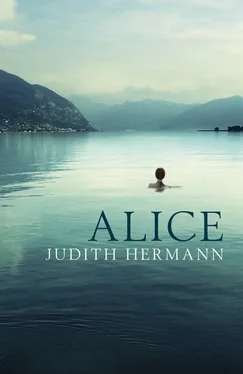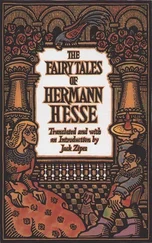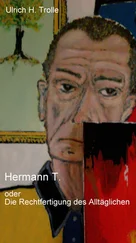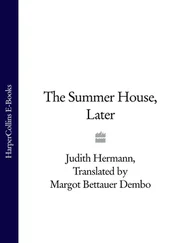Judith Hermann - Alice
Здесь есть возможность читать онлайн «Judith Hermann - Alice» весь текст электронной книги совершенно бесплатно (целиком полную версию без сокращений). В некоторых случаях можно слушать аудио, скачать через торрент в формате fb2 и присутствует краткое содержание. Год выпуска: 2011, Издательство: Clerkenwell, Жанр: Современная проза, на английском языке. Описание произведения, (предисловие) а так же отзывы посетителей доступны на портале библиотеки ЛибКат.
- Название:Alice
- Автор:
- Издательство:Clerkenwell
- Жанр:
- Год:2011
- ISBN:нет данных
- Рейтинг книги:3 / 5. Голосов: 1
-
Избранное:Добавить в избранное
- Отзывы:
-
Ваша оценка:
- 60
- 1
- 2
- 3
- 4
- 5
Alice: краткое содержание, описание и аннотация
Предлагаем к чтению аннотацию, описание, краткое содержание или предисловие (зависит от того, что написал сам автор книги «Alice»). Если вы не нашли необходимую информацию о книге — напишите в комментариях, мы постараемся отыскать её.
Alice — читать онлайн бесплатно полную книгу (весь текст) целиком
Ниже представлен текст книги, разбитый по страницам. Система сохранения места последней прочитанной страницы, позволяет с удобством читать онлайн бесплатно книгу «Alice», без необходимости каждый раз заново искать на чём Вы остановились. Поставьте закладку, и сможете в любой момент перейти на страницу, на которой закончили чтение.
Интервал:
Закладка:
Maja came into the kitchen-living room; she leaned against the bedroom doorway. The door frame was cobbled together from old beams, an imitation of permanence. The child crawling behind her on all fours now pulled herself up on Maja’s hand and twined her little arms around Maja’s knee. Wearing only a shirt and tights, and hiccupping softly, she looked heartbreakingly tired.
Alice said, we’re really glad to be here. It’s lovely; the garden alone — she searched for a gesture and found none — but it didn’t matter at all. The man and the woman finally left, finally dragged themselves upstairs. Heavy animals, shy and curious; they went up the stairs backwards, kept calling out reassurances, consolations, directions — until they disappeared from view, the man first. Maja pushed the door shut with the palm of her hand; then leaned her head against the glass pane.
That afternoon Alice went to see Misha once more. For an hour, while Maja and the child slept. She left the development, then walked along the street into town, downhill through the woods. It was no longer raining, just misty and cold. She had her hands in her jacket pockets and a scarf around her neck. It was peaceful in the hospital. A mosaic in the entrance hall showed a monk with his arms spread in a blessing under a sky of thousands of tiny blue tiles. Next to it a coffee machine was humming. Alice walked past a bulletin board full of passport photos of the hospital’s doctors, nurses, and nuns. She could have looked for the face of the little wrinkled nun who had asked what sort of man Misha had been. Could have looked for her name, but something kept her from doing it.
She took the lift up to the seventh floor and could hear Misha’s breathing as the doors slid open. The door to his room was slightly ajar. Misha lay there as though he hadn’t moved in all the hours she’d been gone. On his back, arms extended to the left and right, face turned to the fading light, mouth open, eyes open. Alice placed the chair she had pushed against the table that morning next to his bed again. She sat down and cautiously said his name. He didn’t react. Still, Alice had the feeling that he knew she was there. Whether it mattered to him that she was there, whether it was a strain for him — that she didn’t know. There was no longer anything to which he could have reacted. Whatever there had once been was gone. All the things that had once existed between him and her were gone too. Nothing left. It was all over; she could say goodbye now. Nothing but the pure, shining present. Alice kissed Misha, as she hadn’t kissed him during his lifetime. She knew that he would never have put up with that kind of kiss were he still conscious.
They ate together that evening, Alice, Maja, and the child. At the table of light-coloured wood, Maja and the child sitting on one side, Alice on the other. Fish and potatoes. The plates with pictures of yellow baby chicks, the glasses with flowers on them. Maja had done the cooking; she cooked with little salt, nothing fancy, a sort of biblical meal; you could call it bland or plain; the child seemed to like it.
Did you eat together often? Alice asked.
Now and then it was possible to ask a question, and Maja would answer, or vice versa, if Maja asked, Alice would answer. But it didn’t go beyond that. Questions and answers don’t make a conversation. And that’s how things stood, Alice thought. A focused emptiness.
Yes, Maja said. Not in the beginning, but later on, we did. When we were living together. Misha liked rice.
Oh, Alice said.
She had seen Misha only rarely this past year, had never visited him in the apartment where he lived with Maja. Actually she hadn’t known anything about the child, and wouldn’t have wanted to. A different Misha? Maybe not.
With the palm of her hand the child batted once resolutely at the plate with the mashed potatoes and fish. Maja took the tiny hand and wiped it gently with a towel, each of the five little fingers individually. The child watched, nodding. After the fish, there was plain yogurt without honey. And lukewarm fennel tea. The child drank the tea from her bottle, which she could already hold by herself. She was sitting in Maja’s lap, looking intently at Alice while she drank.
Well, Maja said, time to go to bed. She carefully set the child on her feet, waiting till she had found her balance. Then she began to clear the table and said, If Misha gets better, if his temperature doesn’t go up again or something, we could order an ambulance next week. Go home, to Berlin. I want him back home. Misha wants that too. He wants to go home.
She rinsed the plates in the sink and put them into the dishwasher, having found the detergent tablets on her own. She moved around the kitchen matter-of-factly and confidently. No hesitation. Maja didn’t shy away from anything; nor did anything seem to disgust her. She wiped the table and switched on the kettle.
She said, Was his temperature up today?
Then, squatting in front of the dishwasher, she briefly studied the buttons and symbols, pushed the door of the machine shut, and turned one of the knobs firmly to the right. Soft gushing sounds. Did he have a fever today?
No, Alice said. She returned the child’s dreamy gaze, grateful for her neutral quiet. That morning, a pale young nurse had anxiously and awkwardly felt for Misha’s pulse and had taken his temperature with a digital thermometer, flinching as if someone had yelled something into her ear at the soft sound — like the chirp of a cricket — that the thermometer made. She then entered some made-up, shaky numbers on a chart and hurried out of the room. The nurse seemed afraid Misha might die while she was taking his temperature. A sudden drop in temperature. Tumbling digital numbers. Plunging towards zero. Alice had the feeling that the nurse’s touch, her fingers searching for a pulse on his wrist and then on his neck, had caused Misha pain; after that Alice no longer held his hand in hers.
She said, No, he didn’t have a fever. Then she got up and said, Let me clear away the rest. I can do it.
You always use so much water, Maja said. You just let the water run when you’re doing dishes, I’ve noticed that before. Misha used to do that, too. But I cured him of it.
Maja put the child to bed. In the room with the big matrimonial bed in front of the mirrored wardrobe. Lots of blankets and pillows. Alice sat at the table in the kitchen, listening.
Where’s the rabbit?
Where’s the rabbit?
Here’s the rabbit. Here it is.
The child’s laughter turned to exhausted crying. Maja hummed, snatches of lullabies, Morgen früh, wenn Gott will, wirst du wieder geweckt — If God will thou shalt wake, when the morning doth break … Now go to sleep. Sleep. Then it was quiet. Alice drank some fennel tea, soundlessly setting her cup down on the tabletop, a kind of meditation. After a while Maja came out of the bedroom, gently pulling the door not quite shut behind her. She sat down on the other side of the table, took a sip of tea, and, like Alice, gazed through the patio door into the dark garden. The glass pane was like a mirror.
Did he say anything to you? Maja asked.
No, Alice said. He was sleeping, the entire time. He scarcely moved. Sighed sometimes, heavily. Nothing else.
Maja nodded. She said, Well, then, I’ll be off now. I think I’d better comb my hair.
Alice said nothing. Maja washed her face in the bathroom, combed her hair; she put on a different sweater, grey with green stripes, fluffy, soft wool; it was like going out in reverse, Alice thought.
You look beautiful, she said.
Maja did look beautiful. With those distinct dark rings under the eyes, slender, pale, and tired; her hair firmly combed back off her face and pinned up. A pulsating, dark glow all around her. They went back into the bedroom and together looked at the child. She was sleeping soundly in a sleeping bag patterned with baby lambs. Lying on her back, her little arms extended in complete surrender, clutching the ear of a soft-toy rabbit in her left fist.
Читать дальшеИнтервал:
Закладка:
Похожие книги на «Alice»
Представляем Вашему вниманию похожие книги на «Alice» списком для выбора. Мы отобрали схожую по названию и смыслу литературу в надежде предоставить читателям больше вариантов отыскать новые, интересные, ещё непрочитанные произведения.
Обсуждение, отзывы о книге «Alice» и просто собственные мнения читателей. Оставьте ваши комментарии, напишите, что Вы думаете о произведении, его смысле или главных героях. Укажите что конкретно понравилось, а что нет, и почему Вы так считаете.












